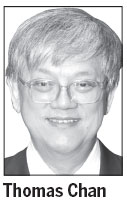Why has anti-Communist bias suddenly arisen in HK?
Updated: 2012-12-19 05:56
By Thomas Chan(HK Edition)
|
|||||||
What has stirred up anti-Communist political sentiments to come to the surface and dominate political discourse in Hong Kong in recent months? As there exists an anti-Communist bias among many residents of Hong Kong, it should come as no surprise to anyone the widespread lack of trust among the local population towards the central government in Beijing. Much of that sentiment resides among those who have left the mainland legally or illegally in favor of the former British colony.
It did come as somewhat of a surprise in the post-handover years that local people's trust in the central government was higher than their trust in the SAR government. It might be that the local population had overcome the fear of the Communist Party of China (CPC).
However, recent developments have reconfirmed the anti-Communist bias of the local population after C.Y. Leung won the Chief Executive election. Never in the past, even during the reign of the colonial government, had the local population been so distrustful of the local government over ideological concerns.

Anti-Communist ideology was used by the colonial government effectively to suppress local organizations and individuals connected with the CPC on the mainland before, during and after the 1967 leftist revolt. The British, however, were so skillful that they could avoid the use of confrontational politics except during the short-lived and failed revolt. The suppressive regime was so well camouflaged that colonial Hong Kong appeared to enjoy freedom of speech even though, effectively, it was a police state with a powerful special branch of police to monitor and contain any unwelcome words or deeds. Ideological politics indeed existed in Hong Kong but the colonial government was able to isolate and contain it, away from the main stream of local polity and society.
After the handover, Hong Kong has become a capitalist enclave of CPC-led China. The high degree of autonomy is conditional over a 50-year period as long as the one-country principle is respected and fully implemented. There should no longer be any restricted boundary between Hong Kong and the mainland to isolate the territory. On the contrary, economic integration and social and cultural exchanges would definitely be boosted by the reunification. But this year since the contest for the Chief Executive started in earnest and especially after CY Leung became the new Chief Executive, ideological politics came to the fore and dominated all political discourses and activities. Why?
One common argument on the side of the opposition is that CY Leung is a Communist and his rule represents the rule of the CPC. However, Leung has denied repeatedly that he is a Communist Party member and there is no evidence that he is.
The opposition has no substance to support this charge, but the argument has been promoted and has served as an excuse to fight almost every policy initiative of the Leung administration. The opposition has now suddenly lost all preference for compromise and become the spearhead for what it hopes to become a mass movement to discredit and overthrow the alleged Communist rule. It seems the opposition is trying to step up its attacks on the Leung administration when it colludes with radical groups of dubious background to call for Leung to step down, and to initiate a no-confidence motion in the Legislative Council.
So far the opposition has tried to inflate the honest issue of illegal structures built in Leung's houses. This is the strategy to win support from the masses against Leung. It has proven successful to the extent that it has inflicted some harm on the popularity of Leung and his administration, but it has not been effective in mobilizing a strong popular force to coerce Leung from office. The demonstration called by the Democratic Party had little response.
The issue over the unapproved structures is not grave enough to give any legal ground for censuring Leung. There have not been any sufficient political causes even to discredit Leung, other than charges founded in making believe that the Leung administration represents the rule of the Communists. The argument is sensational and appeals to the anti-Communist bias of the local population, but without supporting evidence the argument won't go far.
Will 2013 witness the fading away of ideological politics because of the fatigue of the population with the exaggerated politicized attacks of the opposition against the government? Or will Leung make mistakes to feed the opposition with concrete evidences to prove their case?
The author is head of China Business Centre, Hong Kong Polytechnic University.
(HK Edition 12/19/2012 page3)